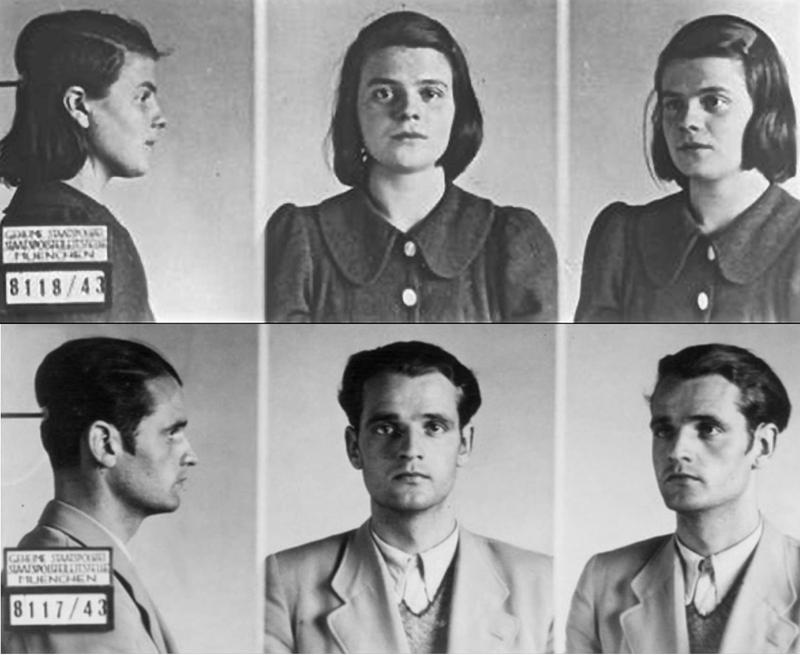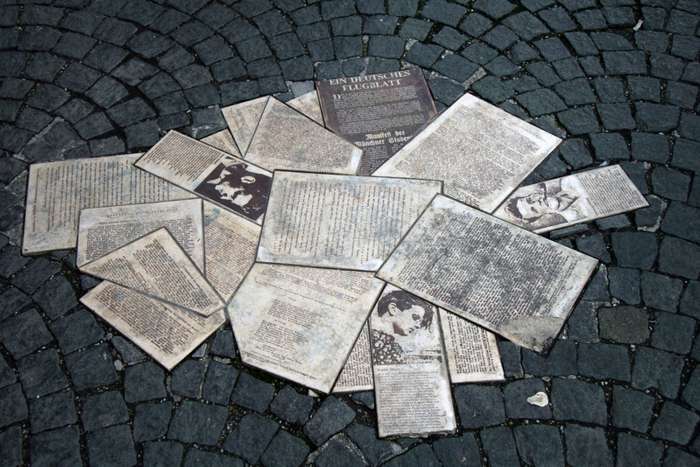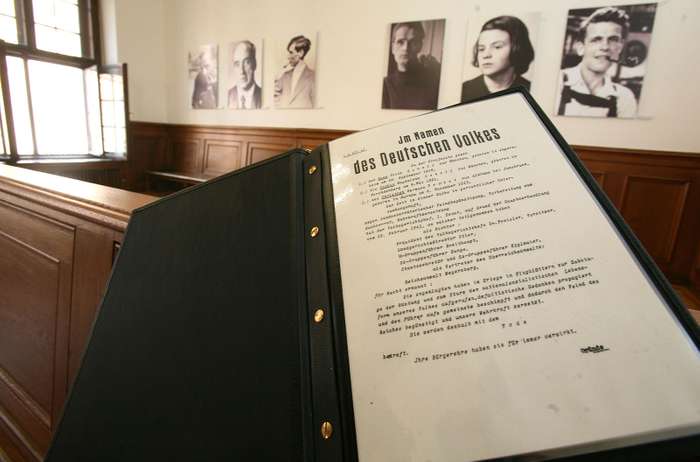
Nazi judge Roland Freisler, the judge who presided the Scholl siblings and Christoph's case, during a session of the People's Court [akg-images]
The White Rose had no direct effect on ending Nazi Germany but illustrated how even in the midst of a dangerous dictatorship, individuals were willing to endanger themselves in order to spread their beliefs, which they are still remembered for today.
February 18, 1943: As Hans and Sophie distributed the sixth leaflet around a building at Munich University, a janitor caught them as Sophie was throwing the remaining leaflets off a balcony in the central hall and they were arrested by Gestapo agents.
February 19: Christoph was also arrested since Hans had Christoph's handwritten draft of a seventh leaflet in his pocket.
February 22: The three were tried, found guilty, and executed by guillotine.
Alex, Willi, and Professor Huber were later taken into custody and executed. Other suspects including friends and family members were also interrogated and arrested.

The balcony from which Sophie threw leaflets at the University Square main building [Evans Chan]

Nazi judge Roland Freisler, the judge who presided the Scholl siblings and Christoph's case, during a session of the People's Court [akg-images]
"Alexander Schmorell, Kurt Huber, and Wilhelm Graf in time of war have promulgated leaflets calling for sabotage of the war effort and for the overthrow of the National Socialist way of life of our people; have propagated defeatist ideas, and have most vulgarly defamed the Führer, thereby giving aid to the enemy of the Reich and weakening the armed security of the nation."
-Trial transcript

Stadelheim prison in Munich, where the Scholl siblings and Probst were beheaded. Hitler's preferred method of executing political prisoners was by guillotine. [Wikipedia]
The members of the White Rose were well aware that protesting the Nazi regime would mean losing their lives, but resistance was a matter of conscience, which outweighed personal safety.

Mug shots of Sophie and Hans Scholl after their arrest by the Gestapo on February 18, 1943 [WSHU Publico Radio]
"Long live freedom!"
-Hans Scholl's last words
"I always understood that I could lose my life in the event of an investigation. I ignored this all because my deep urge to combat National Socialism was stronger."
-Alexander Schmorell
"I acted as I had to act prompted by a voice that came from within."
-Kurt Huber
Instead of inspiring revolution, the fate of the White Rose only instilled more fear in others who disagreed with Nazism. They were an example of what would happen to people who protested.
Being loyal to the Nazi Party, Munich University publically dissociated itself from the White Rose and held demonstrations of their loyalty to Nazi Germany and Hitler.
“Hundreds of students cheered and stamped their feet in applause for the denouncer and university janitor, and he took this standing and with his arm outstretched."
-Witness to a "demonstration of loyalty" at Munich University
"What we have said and what we have written is what so many people believe, only they don't dare speak up."
-Sophie Scholl
Today, the White Rose are seen as heroes rather than traitors and are honored and proudly remembered by Germans.

Replicated leaflets embedded in the pavement outside the University of Munich [dreamstime]

A copy of White Rose member death sentences at the Munich district court as a memorial [Getty Images]

Munich's University Square, now named Geschwister-Scholl-Platz (Scholl Siblings Square) [Rose Marie Curteman]

The White Rose Museum [Destination Munich]
"What we did will make waves."
-Sophie Scholl
"You will go down in history. There is such a thing as justice despite this. I am proud of you both."
-Robert Scholl to his children, Hans and Sophie